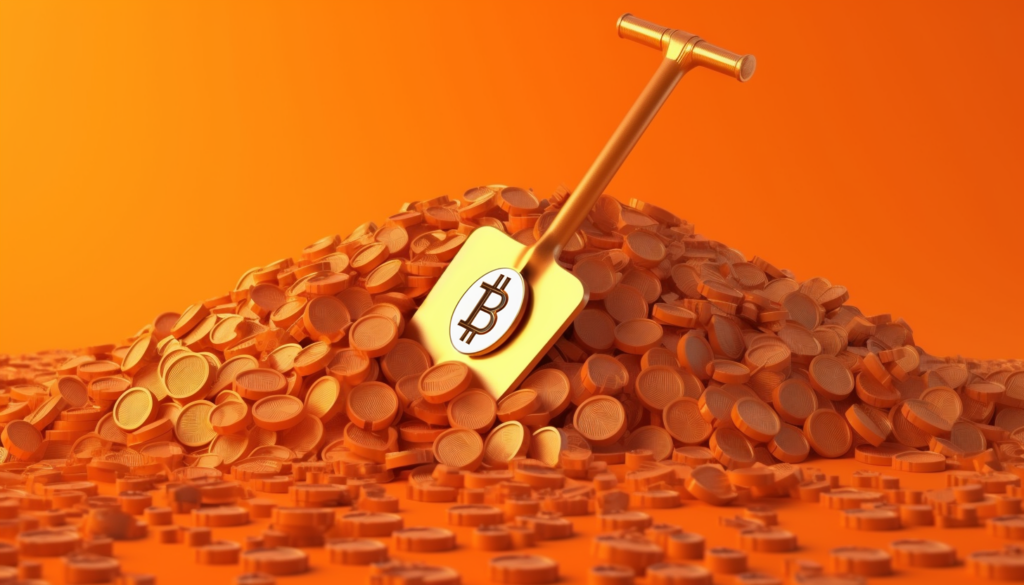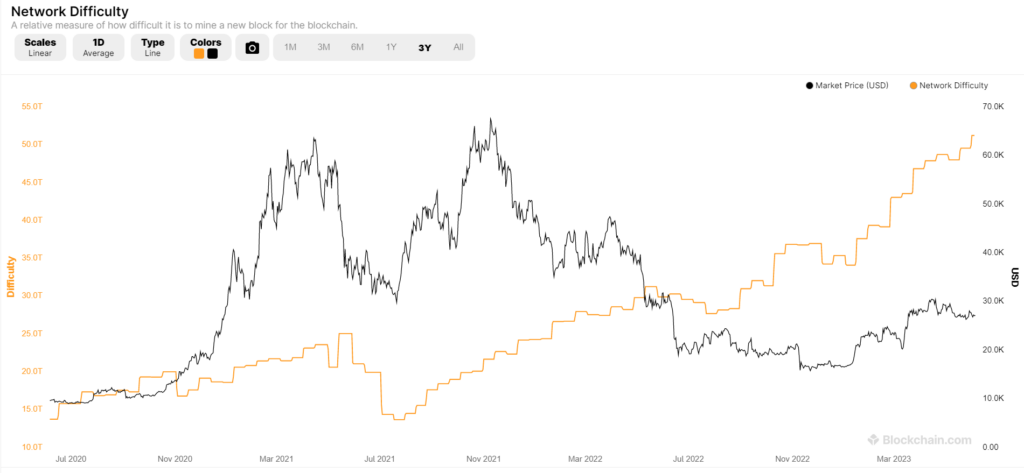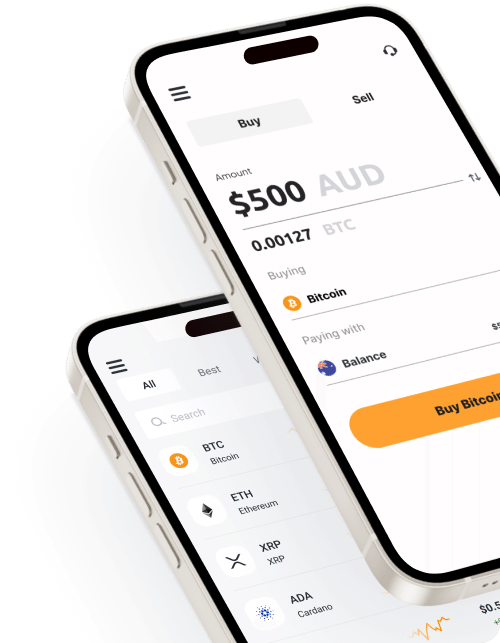
As a newcomer to the world of crypto, you may have heard about the process of Bitcoin mining and wondered how long it takes to mine 1 Bitcoin. In this blog post, we will delve into the fascinating world of Bitcoin mining, explore the inner workings of the Bitcoin network, and discover why Bitcoin mining remains an integral part of the cryptocurrency ecosystem.
Table of contents:
- What is Bitcoin?
- What is Bitcoin mining?
- How long does it take to mine 1 Bitcoin?
- Is mining Bitcoin in 2023 profitable?
- Important Bitcoin mining terms
- FAQ
What is Bitcoin?
Bitcoin is a digital currency that operates on a decentralised network, meaning it is not controlled by a central authority like a traditional bank or government. Instead, it relies on tens of thousands of computers around the world, known as nodes, to validate and secure transactions.
The future of Bitcoin:
As the popularity of Bitcoin continues to grow, so does its value. Bitcoin prices have been known to fluctuate, with some experts predicting that one Bitcoin could be worth millions of dollars in the future. This potential for growth has captured the imagination of investors and enthusiasts alike.
Understanding the blockchain:
The blockchain is a public ledger that records all Bitcoin transactions, ensuring transparency and security. Each block in the chain contains a list of transactions, which are verified by miners before being added to the blockchain.
What is Bitcoin mining?
Bitcoin mining is the process of using powerful computers, called miners, to validate and secure transactions on the Bitcoin network. Miners compete to solve complex mathematical problems, and the first one to find the solution adds a new block to the blockchain, earning block rewards in the form of bitcoins.
How does Bitcoin mining work?
Miners earn rewards in two ways: block rewards and transaction fees. When a new block is added to the blockchain, the miner who successfully adds it receives a fixed amount of Bitcoins, known as the block reward. They also collect transaction fees from users who want to prioritise their transactions. While solo mining is possible, it is highly unlikely for a solo miner to successfully mine a block on their own. As a result, most miners join the largest Bitcoin mining pools to increase their chances of earning rewards.
Risks of Bitcoin mining:
Mining operations come with their own set of risks, such as the high electricity cost and the environmental impact of using non-renewable energy sources. Many crypto-mining facilities have started to explore renewable energy options, like solar or wind power, to reduce their carbon footprint.
Why do Bitcoins need to be mined?
The mining process is essential for maintaining the integrity and security of the Bitcoin network. Without miners, transactions would be left unverified, and the decentralised nature of the network would be compromised.
How long does it take to mine 1 Bitcoin?
There are several factors that affect how long it takes to mine one Bitcoin. These include the mining hardware you’re using, the mining difficulty, and whether you’re part of a mining pool or operating solo. In general, it can take anywhere from several months to years for a mining operation to mine 1 Bitcoin, depending on these factors.
Mining difficulty:
As more miners join the network and contribute their computing power, the Bitcoin network adjusts the mining difficulty to maintain a consistent rate of new blocks being added to the blockchain. The higher the mining difficulty, the more hash rate (or hashing power) is required to successfully mine a Bitcoin block. This means that as the network grows and more miners join, it becomes increasingly difficult for individual miners to compete and successfully mine a block.

Mining hardware:
The type of mining equipment used can have a significant impact on how long it takes to mine one Bitcoin. High-performance mining hardware, such as Application-Specific Integrated Circuits (ASIC) miners, are designed specifically for mining and provide much greater computing power than traditional Graphics Processing Unit (GPU) miners. Consequently, miners with more powerful hardware have a higher chance of successfully mining a single block, reducing the time it takes to mine one Bitcoin.
Mining pools:
Mining pools are groups of miners who combine their computing resources to increase their chances of mining a block. By working together, miners in a pool have a higher likelihood of finding a solution to the mathematical problem and receiving block rewards. The rewards are then split among the pool members according to the mining pool fees and their individual contributions. While mining pools increase the chances of success for miners, they also reduce the amount of Bitcoin each miner receives, potentially extending the time it takes to mine one Bitcoin.
Mining Software:
Efficient mining software can help optimise mining performance, allowing miners to utilise more computing power and increase their chances of successfully mining a block. This can help reduce the time it takes to mine one Bitcoin, especially for miners with limited hardware resources.
Is mining Bitcoin in 2023 profitable?
Determining whether Bitcoin mining is profitable in 2023 depends on factors such as the cost of electricity, mining hardware, and mining difficulty. As the price of bitcoin continues to fluctuate, so does the potential for profit. However, increasing mining difficulty and competition have made it more challenging for individual miners to turn a profit.
Important Bitcoin mining terms:
Hash rate: The hash rate is a measure of the computational power used by miners to solve the mathematical problems required to mine a Bitcoin block.
Hash: A hash is a fixed-length output generated by a cryptographic function from input data (in this case, transaction data).
Previous block: In the blockchain, each block contains a reference to the previous block, creating a linked chain of blocks.
Mining rig: A mining rig is a specialised computer designed for mining cryptocurrencies like Bitcoin.
Mining pool: A mining pool is a group of miners who combine their resources to increase their chances of mining a block and receiving block rewards.
FAQ:
How do Bitcoin miners get paid?
Miners are paid in two ways: block rewards, which are a fixed amount of bitcoins awarded to the miner who successfully mines a block, and transaction fees, which are collected from users who want to prioritise their transactions within the blockchain.
How many computers do you need to mine 1 Bitcoin?
The number of computers required to mine one Bitcoin depends on factors such as the mining hardware, mining difficulty, and whether you’re mining solo or as part of a mining pool. In general, more powerful mining hardware and participation in a mining pool can increase the chances of successfully mining one Bitcoin.
Can I mine Bitcoin on my laptop?
While it is technically possible to mine Bitcoin using a laptop, most miners use specialised mining hardware, such as ASIC miners, which provide significantly more computational power. Mining on a laptop is not recommended, as it is unlikely to yield any significant rewards and can cause damage to your device due to overheating.
Can you mine Bitcoin for free?
There are no truly “free” methods of mining Bitcoin, as mining requires specialised hardware and consumes a significant amount of electricity, both of which come with associated costs.
Do I get taxed on Bitcoin mining?
Tax regulations regarding Bitcoin mining vary by jurisdiction. In most countries, Bitcoin mining is considered a taxable event, and miners are required to report their earnings as income. It is essential to consult with a tax professional or research your local tax laws to understand your obligations as a Bitcoin miner.
Remember, the world of cryptocurrencies is always changing, and staying informed is the best way to ensure you make informed decisions when it comes to investing, mining, or using digital currencies like Bitcoin. Good luck, and happy mining!



